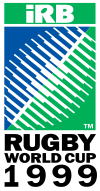1999 Rugby World Cup
 |
|
| Tournament details | |
|---|---|
| Host nation |
|
| Dates | 1 October 1999 – 6 November 1999 |
| No. of nations | 20 (65 qualifying) |
| Final positions | |
|
Champions |
|
| Runner-up |
|
| Third-place |
|
| Tournament statistics | |
| Matches played | 41 |
| Attendance | 1,750,000 (42,683 per match) |
| Top scorer(s) |
|
| Most tries |
|
|
← 1995
2003 →
|
|
| Qualified for quarter-finals |
| Qualified for quarter-final play-offs |
| Qualified for quarter-final play-offs |
The 1999 Rugby World Cup was the fourth Rugby World Cup, the quadrennial international rugby union championship. It was principally hosted by Wales, and was won by Australia. This was the first Rugby World Cup to be held in the sport's professional era.
Although the majority of matches were played outside Wales (shared between England, France, Scotland and Ireland) the opening ceremony, the first match and the final were held in Cardiff.
Four automatic qualification places were available for the 1999 tournament; Wales qualified automatically as hosts, and the other three places went to the top three teams from the previous World Cup in 1995 – champions (South Africa), runners-up (New Zealand), and third-placed (France). Qualification for the final 16 places took place between 63 other nations.
The tournament was expanded to 20 teams (from 16), divided into five pools of four teams, a scenario that necessitated a quarter-final play-off round involving the five runners-up and best third-placed team to decide who would join the pool winners in the last eight. The 1999 tournament saw the introduction of a repechage, effectively a second chance for teams that had finished runners-up in each qualifying zone. Uruguay and Tonga were the first nations to profit from the repechage, and took their places alongside fellow qualifiers Australia, England, Ireland, Scotland, Italy, Argentina, Fiji, Samoa, Romania, Canada, Namibia, Japan, Spain and the United States.
...
Wikipedia
